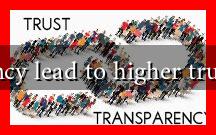-
Table of Contents
Does Transparency Lead to Higher Trust in Companies?
In an era where consumers are increasingly aware of corporate practices, the concept of transparency has emerged as a critical factor in building trust between companies and their stakeholders. This article explores the relationship between transparency and trust, examining whether greater openness leads to enhanced consumer confidence and loyalty.
The Importance of Transparency in Business
Transparency in business refers to the openness with which a company shares information about its operations, decisions, and practices. This can include financial disclosures, ethical sourcing, labor practices, and environmental impact. The importance of transparency can be summarized in the following points:
- Consumer Expectations: Modern consumers expect companies to be open about their practices, especially regarding sustainability and ethical behavior.
- Accountability: Transparency holds companies accountable for their actions, fostering a culture of responsibility.
- Reputation Management: Companies that are transparent are often viewed more favorably, which can enhance their reputation.
How Transparency Builds Trust
Trust is a fundamental component of any successful business relationship. When companies are transparent, they create an environment where stakeholders feel informed and valued. Here are some ways transparency fosters trust:
- Open Communication: Transparent companies communicate openly with their customers, addressing concerns and providing updates on their practices.
- Consistency: Consistent transparency in messaging and actions reinforces trust over time.
- Empowerment: When consumers have access to information, they feel empowered to make informed decisions, which can lead to increased loyalty.
Case Studies: Companies That Embrace Transparency
Several companies have successfully implemented transparency as a core value, leading to increased trust and customer loyalty. Here are a few notable examples:
- Patagonia: This outdoor clothing brand is known for its commitment to environmental sustainability. Patagonia openly shares information about its supply chain and the environmental impact of its products, which has garnered a loyal customer base.
- Buffer: A social media management platform, Buffer is renowned for its transparency in salary structures and company performance. By sharing this information publicly, Buffer has built a strong culture of trust among its employees and customers.
- Everlane: This fashion retailer emphasizes “radical transparency” by providing detailed information about the factories where its products are made, the costs involved, and the markup on its items. This approach has resonated with consumers who value ethical fashion.
Statistics Supporting Transparency and Trust
Research supports the notion that transparency can lead to higher trust levels among consumers. According to a 2021 survey by the Edelman Trust Barometer:
- 81% of consumers said that they need to be able to trust a brand to buy from them.
- 63% of consumers said they would buy from a company that is transparent about its business practices.
- 73% of respondents indicated that they would be more loyal to a brand that is open about its operations.
These statistics highlight the growing importance of transparency in fostering trust and loyalty among consumers.
Challenges to Achieving Transparency
While transparency is beneficial, it is not without its challenges. Companies may face obstacles such as:
- Fear of Repercussions: Companies may hesitate to disclose negative information due to fear of backlash or loss of reputation.
- Complexity of Information: The intricacies of business operations can make it difficult to present information in an easily digestible format.
- Competitive Concerns: Companies may worry that sharing too much information could give competitors an advantage.
Conclusion
In conclusion, transparency plays a vital role in building trust between companies and their stakeholders. As consumers increasingly demand openness regarding corporate practices, companies that embrace transparency are likely to foster stronger relationships with their customers. The examples of Patagonia, Buffer, and Everlane illustrate how transparency can lead to enhanced trust and loyalty. While challenges exist, the benefits of transparency far outweigh the risks, making it an essential strategy for companies aiming to thrive in today’s market.
For further reading on the importance of transparency in business, you can visit Edelman’s Trust Barometer.

